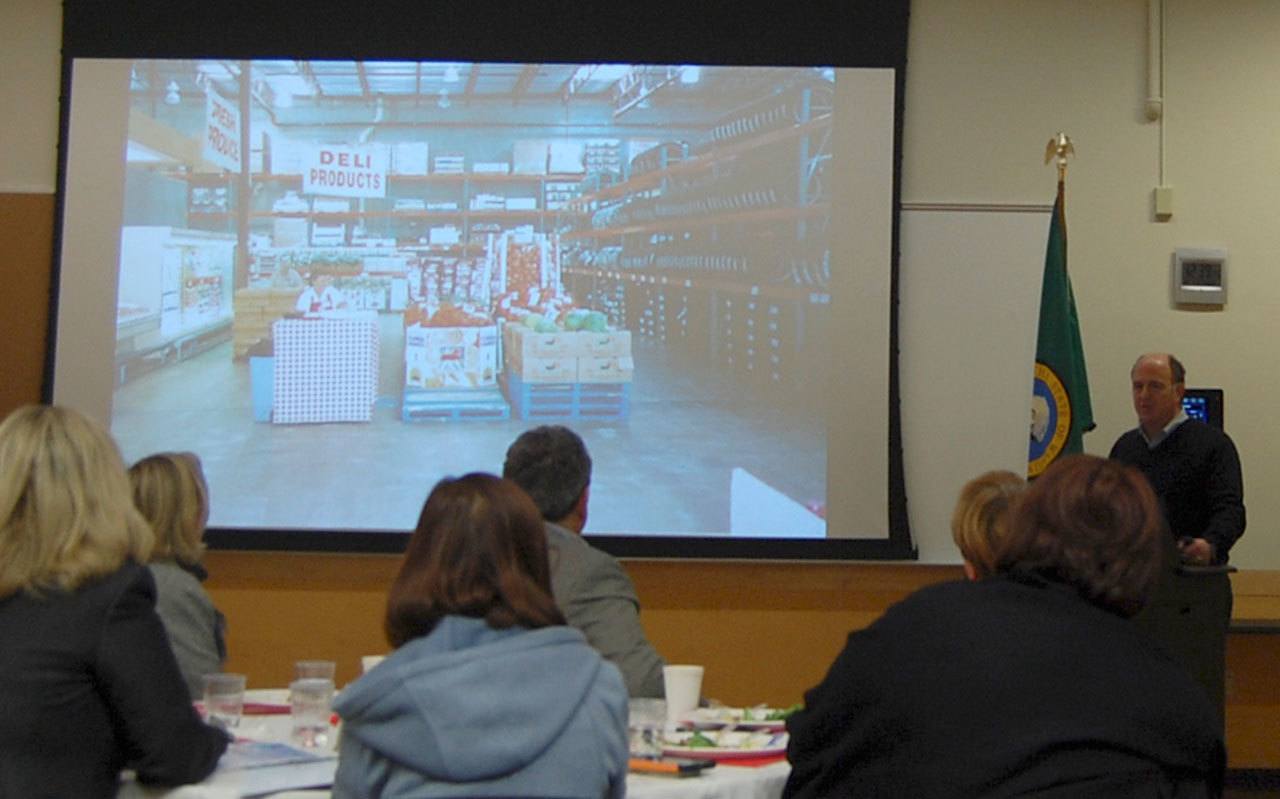In the days leading up to Thanksgiving, Costco sold 16.9 million dinner rolls and 1.8 million pumpkin pies. It sells 7,000 TVs per day and 83 million rotisserie chickens per year. It is the second-largest global retailer, and has 723 warehouses around the world. Not bad for a company whose initial idea of success was opening 30 locations in the Pacific Northwest.
Island resident and Costco CFO Richard Galanti has been with the company from the beginning, since it opened its first warehouse in Seattle in 1983. As the featured speaker at the Dec. 1 Mercer Island Chamber of Commerce meeting, he discussed the company’s past, surprising details about its present and speculated on the future.
Costco’s philosophy boils down to a candid concept: keep costs down and pass the savings on to the members.
“We do simple better than anybody,” Galanti said.
Costco is headquartered in Issaquah but is undergoing a huge global expansion. Galanti showed several photos of warehouse locations around the world, most with crowds of customers and full parking lots. One of the locations in South Korea has a five-story parking garage that fills by about 8:30 a.m.
Galanti said that the Costco concept “works everywhere;” some of its most successful stores are in Korea and Taiwan.
“[Even if] they don’t have cars, [or] they have small apartments … they figure it out,” he said.
Costco also developed a 25-year master plan with the city of Issaquah to expand its headquarters, which is home to about 4,500 employees, with additional square footage and parking.
“Our plan is to grow where we are,” Galanti said. “But it’ll still be a couple years before the shovel is in the ground.”
About 90 percent of Costco’s employees are hourly, and the company values promoting from within and paying a fair wage, Galanti said, which averages to about $22 per hour.
Things have changed a lot since the early days of retail, Galanti said. Some of his family members managed liquor and grocery stores 50 years ago.
“Let’s say a can of corn retailed for 19 cents,” he said. “My uncles would buy 20 cases, build a big display with a sign that said, ‘Special: Five for $1,’ and sell the hell out of it at 20 cents a can … That was retail.”
Costco’s philosophy is just the opposite, Galanti said. He said the company is constantly trying to figure out how to “improve the product, drive more volume, get more buying power with the vendor and lower the price even further.”
And retail is still changing. Galanti said that Amazon, the “800-pound gorilla in the room,” is likely to overtake Costco (which is second only to Walmart now) as the world’s second -largest retailer.
“There’s value in what they do and value in what we do,” he said.
Galanti said that the company has always stuck to its values, done what’s right and sought long-term success over short-term gains. For example, Costco has a very generous return policy; memberships can be refunded in full at any time before they expire, and Costco guarantees almost all of their products with a full refund. There are sure to be a few people who abuse it, but those who appreciate it become customers for life, he said.
Costco has been recognized for its other departments, including its travel, optical, pharmacy and wine departments and of course, the food court, where the price of a hot dog and refillable soda ($1.50) hasn’t changed since 1985.
“As soon as someone hears the word Costco, they want to come over and tell you a story or brag about something, whether it’s the giant teddy bear, or the great wine, or the oversized chickens or whatever,” he said. “We try to wow you and gain your loyalty.”
Costco has a wide variety of changing inventory and is known for carrying products for a time, then discontinuing them or using them as seasonal products. About 20 percent of product on the shelf at any given time is seasonal, Galanti said.
In the quest to offer high quality goods at low prices, Costco developed its own private label: Kirkland Signature. Its large membership base and tremendous buying power, combined with a never-ending quest for efficiency, result in the best possible prices for its members, according to its website.
Costco is also working on sustainability and animal welfare issues.
Through mergers, Costco’s overall corporate history dates back to 1976, when its former competitor Price Club was founded in San Diego. Jim Sinegal, the founder, chairman, and former longtime CEO of Costco, used to say, “there’s no price too low,” Galanti said. Sinegal’s philosophy, which revolved around treating suppliers, employees and customers fairly, is followed today.
Galanti said that the company also has a great work culture and a sense of humor. He showed the Chamber a clip from the popular TV show “Modern Family,” in which characters Mitch and Cam take a trip to Costco, looking for diapers but finding much more.
Cam likens himself to the store at the end of the clip, saying, “I’m sort of like Costco. I’m big, I’m not fancy and I dare you to not like me.”
For more, see www.costco.com.


